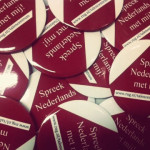Arts staff: policy correspondence in English
‘We have a lot of international employees and students who have just arrived and can’t understand Dutch. However, all important policy documents from the departmental boards are in Dutch’, says Charlene Croes, who represents the staff on the Arts Faculty Council. ‘We also have degree programmes like International Relations and International Organization, American Studies and the Research Master programmes where English is already the main language.’
Dutch difficult
Bastiaan Aardema, who is also a member of the Arts Faculty Council, says that Dutch is quite difficult to understand for international students and IRIO staff, especially when they have just arrived in the country. ‘According to the Faculty, international students should be able to read Dutch within two years of arriving at the University, but in reality that’s not always the case. Also, the correspondence is quite difficult to understand for foreign students on programme committees.’
Two years
Arts Faculty Vice-Dean Dirk Jan Wolffram is aware of the problem but says it is Faculty policy to write documents and memos in Dutch. The Arts Faculty’s international staff are required to speak the language within two years of joining. ‘Also, it is reasonable to expect that international teachers who have just started will not immediately join boards and committees. They need time to get to know the organization and our education system’, Wolffram says.
In other faculties, like Mathematics and Natural Sciences and Economics and Business, most important policy documents are translated into English.






